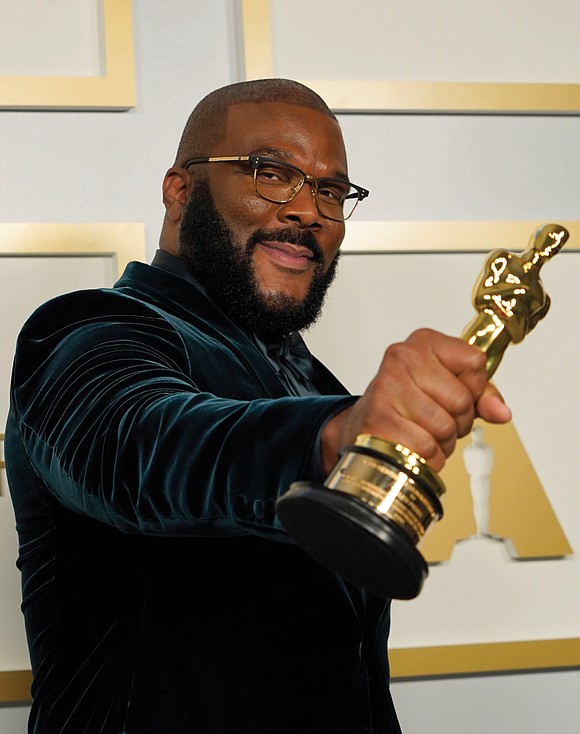Oscars awarded to people of color during year of pandemic
Free Press wire reports | 4/29/2021, 6 p.m.

The 93rd Annual Academy Awards was a mix of triumphant firsts for African-Americans, other people color and women during a glitter fest held Sunday for the first time at Union Station in downtown Los Angeles.
The ceremony, streamlined and lacking crowds because of the pandemic, contained many of the traditions that mark Hollywood’s biggest night.
The year’s nominees as a whole were cited as a sign of racial progress in the run-up to the show, six years after a constant lack of minority nominees prompted the #OscarsSoWhite hashtag on social media.
Nine of the 20 nominees in the acting categories were people of color. Though after wins by Daniel Kaluuya as best supporting actor and Yuh-Jung Youn as best supporting actress for her role in the film “Minari” about a Korean American family moving to an Arkansas farm, white actors — Frances McDormand and Anthony Hopkins — won the Academy Awards for best actress and best actor. Black actors Viola Davis, and especially the late Chadwick Boseman, had been expected to win for their work in “Ma Rainey’s Black Bottom.”
Mr. Kaluuya, who won the Oscar for his performance as Black Panther Party leader Fred Hampton in “Judas and the Black Messiah,” praised the late Mr. Hampton and his mission of unity during his acceptance speech. “He was on this Earth for 21 years ... and he found a way to feed kids breakfast, educate kids, give free medical care.”
He told the audience, “There’s so much work to do.”
Mia Neal and Jamika Wilson broke an Oscar glass ceiling, becoming the first Black women to win for makeup and hairstyling for the film “Ma Rainey’s Black Bottom.” It was a first since the category was created by the Academy in 1981.
They shared the award with makeup artist Sergio Lopez-Rivera.
“I stand here, as Jamika and I break this glass ceiling, with so much excitement for the future,” said Ms. Neal, 41, who headed the film’s hair department. In her acceptance speech, she described the accomplishments despite racial barriers faced by her late grandfather, James Holland, a Tuskegee Airman and deputy mayor of Gary, Ind., and Northwestern University track star who represented the U.S. in the first Pan Am games.
“I wanted to say thank you to our ancestors who put the work in, were denied, but never gave up,” Ms. Neal said.
Travon Free became the first Black winner in the live-action short category for his work co-directing “Two Distant Strangers,” about a young Black man forced to repeatedly relive a deadly encounter with a police officer.
He shares the award with his co-director, Martin Desmond Roe.
In a powerful acceptance speech, Mr. Free, who wore a suit jacket lined with the names of people killed by police, talked about police violence and how those killed are disproportionately Black.
“James Baldwin once said the most despicable thing a person can be is indifferent to other people’s pain. So I just ask that you please not be indifferent. Please don’t be indifferent to our pain,” he said.
He said backstage that the film’s nomination and victory is itself a possible sign of progress.
“It’s amazing that we could be here today holding Oscars for a film about police brutality,” Mr. Free said. “It’s incredible.”
Stephen Colbert’s music director Jon Batiste, Trent Reznor and Atticus Ross took home the Oscar for best original score. Their work on the animated Pixar film, “Soul,” beat out music by Emile Mosseri (“Minari”), Terence Blanchard (“Da 5 Bloods”), James Newton Howard (“News of the World”) and another Reznor/Ross collaboration on the score for David Fincher’s latest film “Mank.”
“Soul” also won best animated feature, while Ann Roth won best costume design for “Ma Rainey’s Black Bottom.”
History already had been made in the directing category before the envelope was opened. For the first time, two women were nominated, Chloe Zhao for “Nomadland” and Emerald Fennell for “Promising Young Woman.” Also nominated was Lee Isaac Chung for “Minari.”
Ms. Zhao won the Oscar for best directing. The China-born director became the first woman of color and only the second woman in Oscar history to win the directing prize, after Kathryn Bigelow.
Frances McDormand won the best actress Oscar for her lead in “Nomadland.”
Actor, filmmaker and philanthropist Tyler Perry used his speech accepting the Jean Hersholt Humanitarian Award to decry racial hatred and encourage healing.
“My mother taught me to refuse hate,” the actor and director said. “She taught me to refuse blanket judgment.”
Actress Viola Davis presented the award to Mr. Perry after a presentation from Whoopi Goldberg that spoke of his support of food-insecure families in Georgia during the pandemic.
“When I set out to help someone,” Mr. Perry said in his acceptance speech, “it is my intention to do just that. I’m not trying to do anything other than meet somebody at their humanity.”
In the opening moments of the Oscars, a time normally filled with monologue jokes and lighthearted musical moments, actor-director Regina King spoke of suffering and racial injustice. She was one of several people during Sunday’s telecast who made it clear this was not a normal year.
“We are mourning the loss of so many, and I have to be honest,
if things had gone differently this past week in Minneapolis, I might have traded in my heels for marching boots,” the Oscar-winning actor and “One Night in Miami” director said in her role as de facto host to open the show.
In addition to her reaction to the guilty verdict of Derek Chauvin’s trial in the killing of George Floyd, Ms. King noted the personal effect recent news cycles have had on her.
“Now, I know that a lot of you people at home want to reach for your remote when you feel like Hollywood is preaching to you,” she said. “But as a mother of a black son, I know the fear that so many live with and no amount of fame or fortune changes that.”










